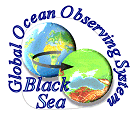An information association fostering co-operation on the global ocean observing system between
associations of marine operational and research agencies in the Black Sea and European regions
The Black Sea GOOS - Euro GOOS
Memorandum of understanding
This Memorandum of understanding (to be
known in brief as Black Sea GOOS - EuroGOOS MoU) serves as the initial
document for cooperation between Black Sea GOOS and EuroGOOS, both of
which are informal associations whose members seek to foster
co-operation on the Global Ocean Observing System, respectively in the
European and Black Sea regions. Both the Black Sea GOOS and EuroGOOS are
established with the recognition of the importance of existing systems
in research and operational oceanography at national and regional scales
and both will take full advantage of the advances made mutually by each
other, by other regional GOOS groups such as Med-GOOS, and by the
various GOOS design panels. By signing the MoU, parties and their member
agencies agree to co-operate in promoting GOOS in the Black Sea and
European regions, and to cooperate towards joint actions and
interactions as needed.
Aims of the cooperation between Black
Sea GOOS and EuroGOOS
In agreeing to cooperate through this MoU, Black Sea GOOS and EuroGOOS will aim to establish means for: joint international planning and implementation of GOOS on national, regional and global levels; mutually coordinating their actions related to operational oceanography, including ocean monitoring, promoting the development of the scientific, technological means to carry out joint programs and concerted actions common to their respective regions of interest, and comparatively assessing the economic and social benefits and impacts of their activities on the region as a whole. They will also aim to bring the coverage and scientific expertise to the same level in both regions, and use the synergism of their combined efforts to build a functional, cooperative network.
Noting the development of a Regional Policy by I-GOOS, the signatory parties will promote collaboration between the Regions, and with other components of GOOS, within the framework of that policy.
Activities
Joint activities of the Black Sea GOOS and EuroGOOS
will be designed to foster collaboration in operational oceanography in
the entire region to maximise the benefits derived from their individual
activities, promoting the integration of these activities within the
framework of GOOS.
Activities
Through mutual collaboration and support,
Members of Black Sea GOOS and EuroGOOS will seek to:
-
Promote collaboration between the
existing regional multi-national agencies programmes, organizations,
and initiatives having expertise in oceanography, operational
systems, and remote sensing of the ocean.
-
Promote collaboration between EuroGOOS, Black Sea GOOS
and Med-GOOS through joint projects and activities.
-
Promote comparative studies and
evaluation of the economic and social benefits produced by
operational oceanography in the European and Black Sea regions.
-
Co-operate as appropriate with
organizations concerned with rapid assessment of climate change,
global environmental research and the impacts of climate variability
and climate change.
-
Establish joint Task Teams to address
problems identified in the development of potential oceanography.
-
Produce and publish syntheses of
findings of meetings, workshops, etc. resulting from either
coordinated or individual EuroGOOS and Black Sea GOOS activities, to
enable joint interpretation of results for better understanding of
scientific aspects or for evaluation of impacts.
-
Co-ordinate inter-regional GOOS data
acquisition based on existing regional and national data gathering
under Agreements and Conventions.
-
Promote development of common
operational data procedures and services, including data quality
control and data management for operational oceanography.
-
Promote pilot studies in GOOS
operations, at inter-regional and global levels.
-
Promote an approach based on common
Instrumentation and Technology.
-
Promote the development of low cost
alternatives for operational instrumentation, observing systems,
data acquisition and data management systems, processing and
interpretation systems, as well as for data exchange.
-
Support operational oceanography and
services in collaboration with public and private sector
organizations, NGOs and programmes concerned with ocean technology
in the Black Sea and European regions.
And in the area of Aid and Capacity
building will seek, in particular, to:
-
Promote aid, technology transfer, and
collaboration between Black Sea and European Countries within the
framework of GOOS.
-
Compensate for the socio-economic
differences between the Black Sea regions through scientific
collaboration, in order to build a uniform, functional network
covering both regions in an effective manner.
|

